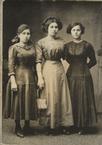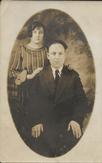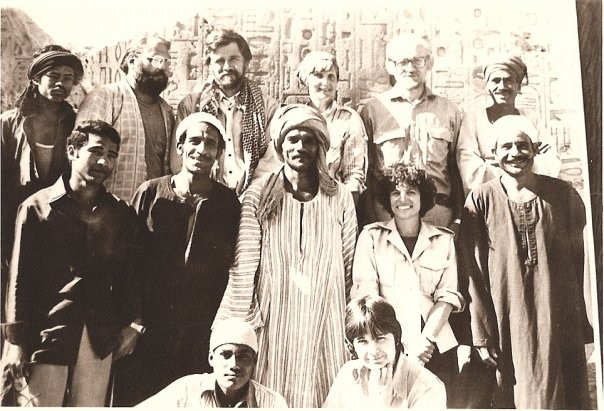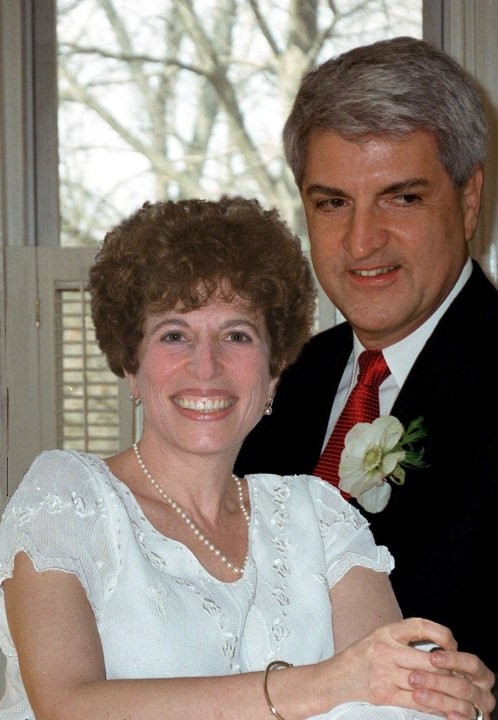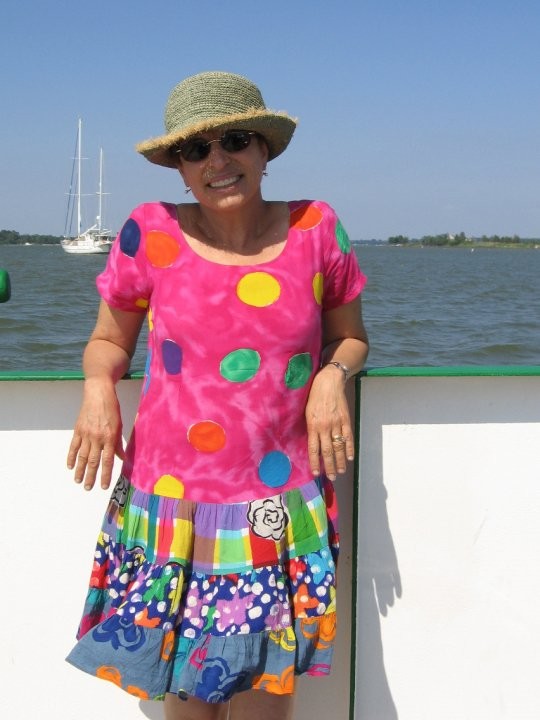Oberlin College and Conservatory
Class of 1968
Elizabeth Sherman Elvy
| Residing In | Washington, DC USA |
|---|
| Spouse/Partner | Philip C. Elvy |
|---|
| Occupation | Science writer (NIMH)/DC tour guide |
|---|
| Children | none yet! |
|---|
Elizabeth's Latest Interactions
I was so sorry to hear about your husband's passing, Myra--and of West Nile virus. So senselss. All best to you, Beth Sherman (Elvy)
Posted on: Sep 10, 2023 at 8:51 AM
HI Shirley, I work at NIH--specifically, I write a monthly newsletter for the National Institute of Mental Health. Not exactly a skin problem. I think the specialist you need--in addition to the infectious disease folks--is an immunologist. Unfortunately, most of those are listed as allergist/immunologists, and I have found allergists to be less sophisticated (i.e., they give you a standard panel of skin-prick tests and think they are done). This is well beyond the Valley of Kaiser. I note from the web--btw, fantastic web page and web presence! I love the Scarlatti--that you live in El Cerrito, CA near Berkeley. I think you need to go to a top-notch medical school to find out about this. Let me check the literature and see if I can find specialists in your area who are doing research on this kind of thing for you to consult.
Posted on: Sep 02, 2023 at 9:42 AM
My god, Shirley! That sounds awful. I know it may not be practical, but have you tried going somewhere else in the country, perhaps where this flea does not exist? At least for awhile? Or perhaps bathing in salt water? Or putting baking powder on your skin? Sorry not to be able to offer any medical solutions that might work--but Berkeley must have some damn good entomologists around who might help. All best to you, Beth
I am so sorry Janie is gone! She was indeed a lovely person. I lived nextdoor in Dascomb freshman year, and Jane was one of the people I will always remember. I would have loved to find out more about her life after Oberlin. Beth Sherman
Posted on: Jan 25, 2023 at 4:33 AM
A belated happy birthday Julie--our most memorably beautiful housemate in Dascomb! I do hope you have had a good life in the intervening half-century since last we met. Beth
Thanks, Dan, for your latest from East Timor. Your posts are always interesting and worthwhile--a pleasure to read. Beth
Obies, Inspired by Ralph Shapira, I am posting a short biography of my Grandmother, who came over to NYC from Galicia, in what is now Poland, in 1907. At the Holocaust Museum in DC, there is a long glass wall etched top to bottom with the names of towns obliterated by the Nazis in WWII. My grandmother's home town is on that wall. Few remain who remember shtetl life. This is my small attempt to preserve the little I remember of what my Grandmother told me about her life in Zeilin and in early 20th Century America. I hope you enjoy reading it. Beth
Posted on: Aug 28, 2022 at 10:26 AM
Inspired by Ralph Shapira's autobiography, I would like to share my thoughts on my late Grandmother. Just now I am far more interested in her vanishing era than in my own. It horrifies me that I may well be one of the last to have actually known immigrant Jews who fled Galicia and came to America before 1910. If you, like me, are historians at heart, I think you will enjoy my recollections of my dear Bubba, who died at age 92, in 1983.
Recollections of my Grandma Rosie
Stories from the mouth of Rose Bass Laubgross (1891-1983)
as recollected by her granddaughter Elizabeth Jane Sherman Elvy (1946- )
August 24, 2024
Prologue
Although I have spent many a pleasant hour—first on Elder Avenue in the Bronx, later in Co-op City, Queens, in NYC—sitting at my Grandma Rosie’s kitchen table, talking over a cup of coffee, and making good use of her excellent rugela (a rolled cookie made with cream cheese dough, filled with cinnamon and pistachio nuts), I never wrote down my grandmother’s stories. Now, so many years after her death (in 1983) and the death of her eldest daughter, my mother Ruth (Rebekah) Laubgross Sherman (in 2009), there are questions no one will ever answer. This narrative is my attempt to get down on paper what I remember of the nearly forgotten people and times my grandmother knew and described so vividly, times made doubly important by the passing of the age of Jewish immigration to America and Hitler’s extermination of nearly all of Europe’s Jews from the earth.
CHAPTER 1. 1907: ‘Rosalie’ comes to America
Imagine our surprise when my mother and I discovered the ship’s manifest of the PENNSYLVANIA, which brought my grandmother to America—only to find that her name was not on it! We were looking for a 16-year-old from Jeilin named Reuse (Rose) Bass. What we found was an 18-year-old from Jolinya named Bas. This had to be her, but mysteriously, the first name was listed as ‘Rozalia’? Rosalie? What Jewish girl from Galicia is called Rosalie? Then it struck us. I believe my grandmother’s formal name was Hensche-Reuse, but of course, her family always called their cherished oldest daughter Reusela (Yiddish diminutive for Reuse, like Rosie for Rose). It was the name she knew and the one she gave to the shipping and immigration officials. That appears to be how she became ‘Rozalia’ on the manifest.
When she set foot in New York on November 1, 1907, Reusela Bass was—by her own account—half-dead from fright. She had left behind her widowed mother, younger sisters, clever younger brother, and grandparents, not to mention her village and her language, and everything she had ever known. She had traveled from her home on the outskirts of the hamlet she called “Je-leen,” (then located in Galicia, Austria; today called Jo?ynia, in eastern Poland), located not far from the Eastern border with Ukraine. When she left home, she traveled to Cracow, the first city she had ever seen, then took the train through Germany to the port of Hamburg. Boarding the PENNSYLVANIA, she sailed in steerage—seasick, frightened, and surrounded by strangers—across the Atlantic to America.
Why would a young girl go off and leave everything she knew behind?
A Love Match
As Rose later recounted, her parents’ marriage had been a rare thing in that community, a love match. Meyer Bass was a brilliant young religious scholar, son of a prosperous shop owner in the town of Lejaysk (pronounced Lejensk), when he fell in love with Minche Kanon, a peasant girl from the nearby village of Jeilin. Much against his parents’ wishes, he married her (probably in 1889 or 1890). The young couple settled in Jeilin, and children (5 or 7) followed every year thereafter. Although dates are uncertain (all that my Grandma Rosie knew about her own birth was that it took place in the time of year ‘when we dug up the potatoes,’ probably September), I reconstruct the young Bass family as follows:
• 1891: Hensche-Reuse (Rose), the eldest child
• 1893: Harche (Helen)
• 1894 (?): Mortra (Mordechai)
• 1896: Suche (Sarah)
• 1897-d. 1903: A young girl who died young. (Rose remembered brushing and braiding her hair. She was very fond of her and always referred to her as ‘the clever girl.’ She had been very distressed when her clever little sister died.)
• Possibly 2 more babies who died young.
Meyer’s unexpected sudden death left his young wife and 5 remaining children destitute. Rose remembered her mother selling vegetables by the side of the road to get money to live. She also remembered visiting her wealthy (by her lights) Bass grandparents, who owned a store and a 'grand' house in Lejaysk. Reuse owned no shoes of her own, and to walk to town to visit them, she had to borrow someone else’s. My grandmother never knew why she was invited to the grand house, because once she was there, her Grandparents apparently ignored her. Even when they sat down to eat their fabulous dinners, she was left standing in the hall. Not once did they invite her to join them, nor did they offer food for her to take home to their starving grandchildren.
On a lighter note, my grandmother once told me about the village half-wit. This woman, who was very poor, apparently went around without underwear, and whenever she was irritated would lift her skirt, slap her bare bottom, and say “Kiss my ass!”
Once I asked Grandma Rosie what women did about periods in that time before Tampax and Kotex, and she said: “We used rags.”
After her father’s death, Hensche-Reuse’s mother was forced to take her out of school so that she could help with the farm work and care for the younger children. Desolate, the young girl resolved that, rather than grow up ignorant, she would throw herself into the brook and drown. Amazingly, she did it. It was winter and the weather was cold, but a passerby pulled her out, saving her life. It was then she determined to make her own way in the world and left for America as soon as she could.
New York, New York
Arriving in New York in 1907, Reusela was met by an uncle who had emigrated before her. (Sadly, I don’t know his name, or whether he was a maternal or paternal uncle. I do know that he was disappointed in his life in New York and eventually returned to Europe.) She reached America with not a word of English. Her native tongue was Yiddish, and she also spoke Polish and some German.
Rose was intensely aware that she was a country girl with few skills that would suit her to city life, not to mention in the bustling pre-WWI city of New York. The only thing she had brought with her was eider down for a warm Überbed (prounounced in Yiddish as ‘Iberbed’), which I slept under when we visited Grandma Rosie in her New York apartment.
In 1907, the fashion was leg-of-mutton sleeves and wasp waists. Always large bosomed, Reuse fretted that she was too fat and even, she remembered many decades later, wore her corset to bed. She also worried because she was not fashionably pale, but rather a healthy, fresh-faced, rosy-cheeked girl from the country.
Taking up residence with her uncle and his wife, Reuse slept on a pullout bed at night and spent her days trying to find work. When she heard of an opportunity to become a seamstress, she invested the little money she had in a pair of scissors. On her first day, the proprietor showed her a shirred dress with hundreds of tiny pleats and told her that was what he wanted. With no clue of how to go about such a task she fled, in her haste leaving behind her precious new scissors--an event was so traumatic, she remembered it with anguish more than three-quarters of a century later.
Another job she had was to be the maid of all work for a family with 9 children. What she remembered most about that job was the backbreaking, dangerous labor involved in washing clothes. She had to fill giant kettles with water and heat them on the stove. She had to put in and stir the clothes, and most of all, she had to make sure that none of the children came near the potentially lethal vats.
In the end, Reuse found a factory job where she worked alongside many other immigrant girls from Eastern Europe. In this factory, the girls sewed handbags, and both the workers and managers spoke Yiddish. The girls worked long hours, six days a week, and breaks were not allowed, but Reuse from Zielin was happy to have the job. Grandma Rosie bore a souvenir of her days as a factory worker all her life. The day she died, a needle that had broken off from one of the machines 74 years before was still visible in the palm of her hand.
Before WWI, it was a feature of Jewish immigrant life in New York for ‘landsmen’—people who hailed from the same towns and areas in Europe—to live in the same neighborhoods. They also attended landsman social clubs, which played a bigger part in the lives of less religious Jews than did the local schuls (synagogues). I know that later in life my Grandfather Joseph Laubgross, who worked as a waiter, mostly for large catered affairs, went out to play cards with friends at such a club almost every evening, much to his wife’s chagrin. He was also a lifelong loyal member of the Odd Fellows. It was perhaps at a meeting of landsmen that he encountered Hensche-Reuse’s uncle, and through him, Reuse herself. Although he hailed from Rohatyn (birthplace of the fabled wife of Ottoman Sultan Suleiman I, Roxelena, but thereby hangs another tale) in today's Ukraine, his town is only about a 150 miles from Reuse’s native Jeilin in Poland.
By the beginning of 1911, the couple were engaged to be married. Despite my grandmother’s reservations about marrying a man so much older than herself (I believe at the time they married, she was 18 and he 29), she was a realist who knew it was far better to face life in America as a married woman. In any case, I know they were engaged in early 1911, because on March 25, 1911, the day of the deadly Triangle Shirtwaist Factory fire broke out, Reuse was working in NY’s lower East Side garment district a few doors away. As soon as he heard about the fire, Joe Laubgross rushed to the garment district to find his fiancée. Luckily, the fire did not spread to the factory where she worked, and none of the workers in it were hurt.
Married Life
On August 30, 1911, Joseph Laubgross and Rose Bass were married in New York City. [See engagement and portrait photos attached.] Their marriage photograph shows my grandfather in his best suit, a gray worsted pinstripe with a coat almost down to the knee, as was the style, and a bow tie. My grandmother wears a formal dress with an embroidered bodice. She later told me that this dress always gave her fits, because the skirt never hung right—as you can see in the picture. Rose’s dark hair is piled high in a loose bun and parted in the middle, so that it falls in full glossy wings, framing her full young face. Both were short (my grandmother was not quite 5' tall), and her eyes (like mine) were hazel, green on the outside and brown in the middle. Neither bride nor groom looks particularly ecstatic. Rather, in the style of the day, their demeanor in the photograph is reserved, with a slight smile visible on Joe’s face and Rose’s face characteristically pensive.
Four days after the marriage—a fact I would not record were my grandmother still alive—she left. We can only imagine why, but the hurt was still fresh when she told me the story. With little choice to do otherwise, she soon returned. Married life resumed, and on December 18, 1912, my mother Ruth (Rebecca–my grandmother swears the doctor liked the name and wrote it on the birth certificate More…
Posted on: Aug 28, 2022 at 9:46 AM
Thanks much for your bio, Ralph. I read it with real interest. It amazes me how much I like the Obies I meet at the reunions--including those I didn't know or even didn't like, as a less forgiving 20-year-old! I never knew you at Oberlin, and as I recall it, I was rather afraid of the guys in the Men's Coop, seemed to me to be obsessed with sex, politics, and drugs. (Of course, I, too, was obsessed with sex and politics... but not with beer, crude language, and drugs. I guess I had heard of pot in those days, but I don't think I ever smoked it until the summer of '67, when I followed the song and went to San Francisco.) But I digress. So sorry you lost first your fine marriage, and next your lovely house. I am heartened that you retained your family ties. You are indeed fortunate now to enjoy a solid and fulfilling life that complements rather than obliterates your earlier gains and experiences. Few who make it through 3/4s of a century can claim to have risen from the ashes of their mistakes so successfully. Chapeau for writing all of this down, and for sharing it with your fellow Obies. Beth


